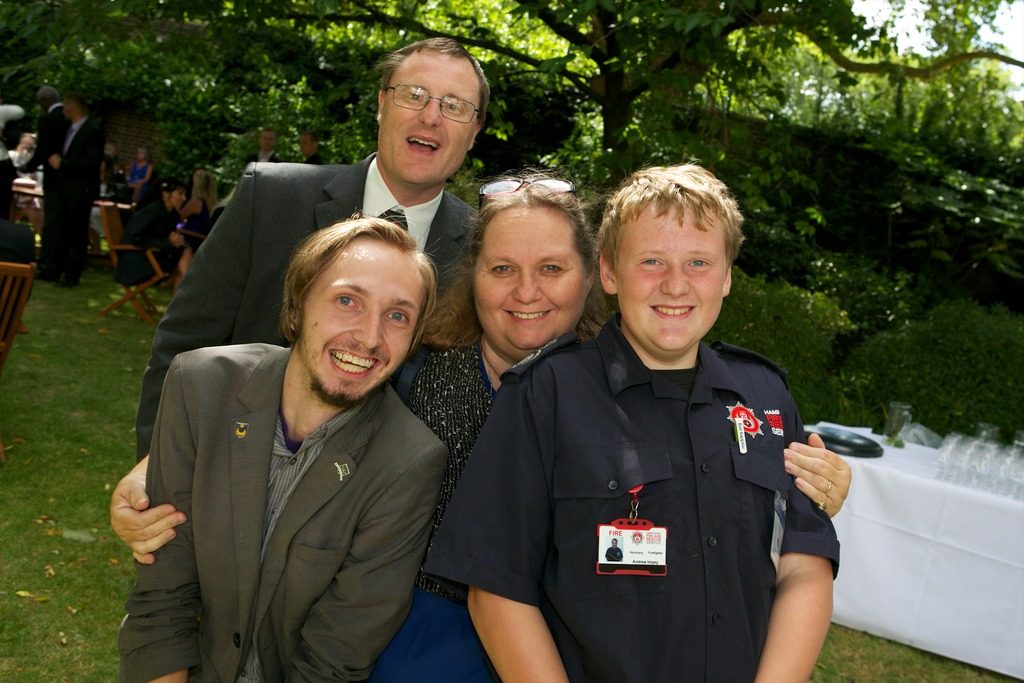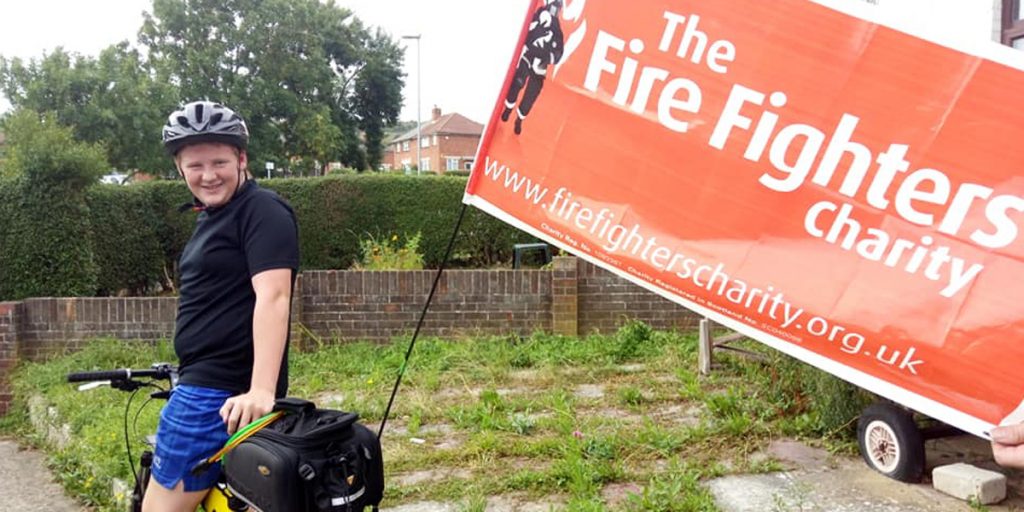Down a quiet road in a suburb of Portsmouth is a small piece of history. The melted torch of a New York Fire Department firefighter sits on a shelf in the bedroom of 13-year-old Andrew Impey. It had been pulled from the wreckage of the World Trade Centre after its owner – one of the first firefighters to enter the stricken buildings in 2001 – dropped it while helping people flee the devastation. Presented to Andrew on a visit to the Big Apple, it is there because of Andrew’s love of the fire and rescue service and his fundraising efforts for Fire Fighters Charity.
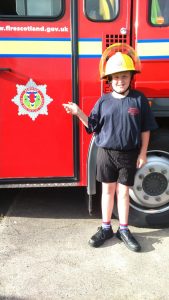 Four years ago, then-nine-year-old Andrew did not really talk. Living with severe autism, he mainly used sign language to communicate, finding the hubbub of conversation too overwhelming to get involved with. Then, on Christmas Eve, wanting a little time to herself, Andrew’s mum Kirstine instructed his dad, Paul, to take him out for the afternoon. Five hours later, having visited three fire stations, Andrew returned full of chatter about what he had seen.
Four years ago, then-nine-year-old Andrew did not really talk. Living with severe autism, he mainly used sign language to communicate, finding the hubbub of conversation too overwhelming to get involved with. Then, on Christmas Eve, wanting a little time to herself, Andrew’s mum Kirstine instructed his dad, Paul, to take him out for the afternoon. Five hours later, having visited three fire stations, Andrew returned full of chatter about what he had seen.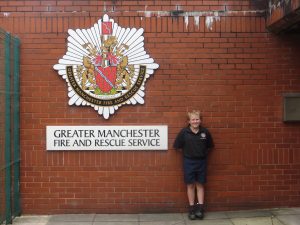
“I just couldn’t believe that this was my son, so full of life, telling me about his day,” says Kirstine. “He asked if he could go visit more fire stations, and I said, if he could find a few local ones, we’d see what we could do. A few hours later, he returned looking very pleased with himself, holding a pile of papers with details of all 51 fire stations in Hampshire. And that was it, we never looked back from that point.”
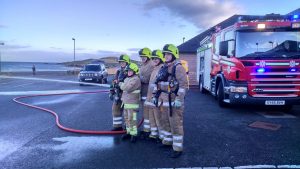 Andrew is on a mission to visit all fire stations within the UK, nearly 3,000, and so far, he’s managed 1,264. It’s been a mission that he can relate to, because of the fire and rescue services’ vital community outreach roles: “I like the fire and rescue service, because it’s a community that is all about helping people,” says Andrew. “They accept people, and allow you to be proud of who you are. With my autism, I didn’t talk very much. But the fire service has helped me with socialising and just coming out of my shell. I feel part of their community. I am autistic but I am a part of the fire service.”
Andrew is on a mission to visit all fire stations within the UK, nearly 3,000, and so far, he’s managed 1,264. It’s been a mission that he can relate to, because of the fire and rescue services’ vital community outreach roles: “I like the fire and rescue service, because it’s a community that is all about helping people,” says Andrew. “They accept people, and allow you to be proud of who you are. With my autism, I didn’t talk very much. But the fire service has helped me with socialising and just coming out of my shell. I feel part of their community. I am autistic but I am a part of the fire service.”
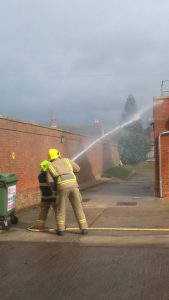 To begin with, this challenge was facilitated purely within the family, Mum, Dad and Andrew, supported with technology by older brother, Peter. But the more stations he visited and the more crews he spoke to, the more momentum Andrew’s challenge gathered. And One Lad’s Challenge was born.
To begin with, this challenge was facilitated purely within the family, Mum, Dad and Andrew, supported with technology by older brother, Peter. But the more stations he visited and the more crews he spoke to, the more momentum Andrew’s challenge gathered. And One Lad’s Challenge was born.
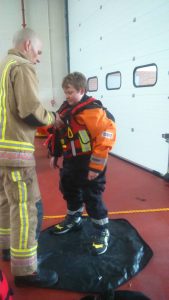 “He went from a couple of Twitter followers, to hundreds, to several thousands,” says Kirstine. “Fire stations would invite us to come along and visit, and when we got there, they’d make such a fuss of him and show him all sorts of things. He’s been in helicopters, up ladders, on boats, in the driving seat, on the pump, inside smoke-filled training rooms, and just seen about as much of life in the fire service as it’s possible to do.”
“He went from a couple of Twitter followers, to hundreds, to several thousands,” says Kirstine. “Fire stations would invite us to come along and visit, and when we got there, they’d make such a fuss of him and show him all sorts of things. He’s been in helicopters, up ladders, on boats, in the driving seat, on the pump, inside smoke-filled training rooms, and just seen about as much of life in the fire service as it’s possible to do.”
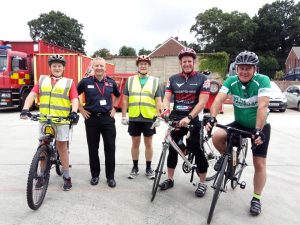 What started as a desire to visit stations became a challenge to raise as much money for the charity supporting his heroes. It was during one particular visit in Norfolk that Andrew realised the enormity of the work done by Fire Fighters Charity: “The firefighter looking after us explained he was off work at the moment due to having a broken back, but that he’d been through the charity,” says Kirstine. “Andrew just looked at him, then after a moment’s pause, he said, ‘so, I’m raising money for your treatment?’ And he looked back at him and said, ‘I’ve never thought about where the money comes from, but yes you are.’ It was magical, this big burly firefighter and my autistic son, staring at each other, both with tears in their eyes. That really spurred him on to raise more.”
What started as a desire to visit stations became a challenge to raise as much money for the charity supporting his heroes. It was during one particular visit in Norfolk that Andrew realised the enormity of the work done by Fire Fighters Charity: “The firefighter looking after us explained he was off work at the moment due to having a broken back, but that he’d been through the charity,” says Kirstine. “Andrew just looked at him, then after a moment’s pause, he said, ‘so, I’m raising money for your treatment?’ And he looked back at him and said, ‘I’ve never thought about where the money comes from, but yes you are.’ It was magical, this big burly firefighter and my autistic son, staring at each other, both with tears in their eyes. That really spurred him on to raise more.”
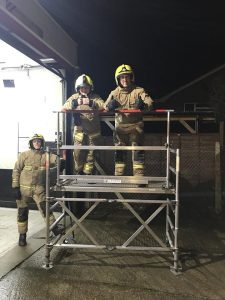 The more fire and rescue personnel he has met, the more Andrew has come out of his shell. His communication skills have also improved through his encounters with the fire services.
The more fire and rescue personnel he has met, the more Andrew has come out of his shell. His communication skills have also improved through his encounters with the fire services.
His family made the decision to home-educate Andrew after traditional schools didn’t work for him. 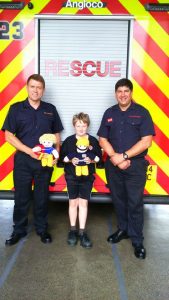 He subsequently taught himself to read – a feat neither his mum nor his old school could manage – so he could get absorbed in the fire magazines and leaflets being given to him during his visits. His wardrobe, meanwhile, now consists entirely of pieces from different fire and rescue services and his bedroom houses his vast collection of kit, uniform and equipment, which he can describe in intricate detail, as well as a pole to get out of bed.
He subsequently taught himself to read – a feat neither his mum nor his old school could manage – so he could get absorbed in the fire magazines and leaflets being given to him during his visits. His wardrobe, meanwhile, now consists entirely of pieces from different fire and rescue services and his bedroom houses his vast collection of kit, uniform and equipment, which he can describe in intricate detail, as well as a pole to get out of bed.
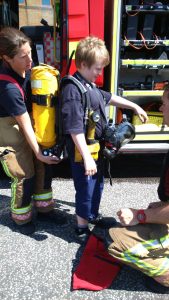 “I have 41 helmets from MAS gallets to American ones, some of which were used in the Californian wild fires,” he says. “I’ve got Rosenbauers, youth fire cadet helmets and kits, an actual Ballyclare kit that they donated to me, I’ve got a Grid Gear fire locker and I’ve got a new Rosenbauer Titan helmet. BA board, BA set, Command Support Pack, Standpipe key and bar, a hose length I got at the Odiham Fire Show a couple of years ago. I’ve got a Utah kit, and just lots of different bits.”
“I have 41 helmets from MAS gallets to American ones, some of which were used in the Californian wild fires,” he says. “I’ve got Rosenbauers, youth fire cadet helmets and kits, an actual Ballyclare kit that they donated to me, I’ve got a Grid Gear fire locker and I’ve got a new Rosenbauer Titan helmet. BA board, BA set, Command Support Pack, Standpipe key and bar, a hose length I got at the Odiham Fire Show a couple of years ago. I’ve got a Utah kit, and just lots of different bits.”
His collection is a combination of donations, purchases and gifts from admiring fans among the fire and rescue community. Oh, and even his bunny rabbit is called Flame.
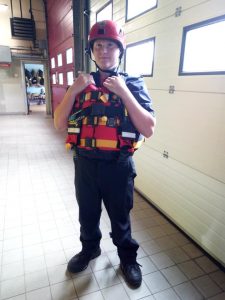 “Most firefighters are astounded that he can not only hold a conversation with them, but also by the extent of his knowledge,” says Paul. “We’ve always said if he doesn’t want to do this anymore, we’ll stop doing it. But while he has the passion and drive to do it, we’ll facilitate it.”
“Most firefighters are astounded that he can not only hold a conversation with them, but also by the extent of his knowledge,” says Paul. “We’ve always said if he doesn’t want to do this anymore, we’ll stop doing it. But while he has the passion and drive to do it, we’ll facilitate it.”
Andrew has raised thousands of pounds by organising vast sponsored bike rides, combining new station visits with fundraising and raising awareness of the charity, as well as autism. He has shared his own experience of the disability, and even influenced firefighters to adapt their approach accordingly.
“In South Wales, they’ve changed their training programmes for mass evacuation because of me,” he says. “With autistic people, if you’re shouting ‘Get Out’ at them in a panicky way, they’ll think you’re telling them off, so you have to take a calmer approach.”
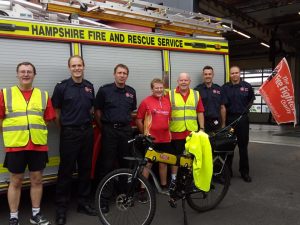 He has visited fire stations around the world, including in New York where he was given the torch from the wreckage of the World Trade Centre, as well as being made an honorary firefighter of New York. He has appeared in local and national papers, been recognised with numerous accolades, and received a Diana Award, chosen by Prince William and Prince Harry for inspirational youngsters, in honour of their late mother.
He has visited fire stations around the world, including in New York where he was given the torch from the wreckage of the World Trade Centre, as well as being made an honorary firefighter of New York. He has appeared in local and national papers, been recognised with numerous accolades, and received a Diana Award, chosen by Prince William and Prince Harry for inspirational youngsters, in honour of their late mother.
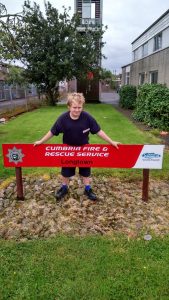 He has gone from being a boy who would not speak to anyone to a confident young man who has a regular slot on his local radio station discussing his challenge.
He has gone from being a boy who would not speak to anyone to a confident young man who has a regular slot on his local radio station discussing his challenge.
“If he hadn’t discovered the fire and rescue service, I don’t think Andrew would have developed as much as he has and he’d still be struggling,” says Paul. “His passion brought him out of himself, and enabled him to cope with his autism. He’s not only benefitting himself, but also the charity, firefighters, and other people living with autism who may some day encounter a firefighter in their time of need. He would be a totally different person if he hadn’t done this.”
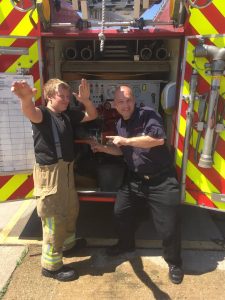 And last year, Andrew received an award from the very charity he has spent so long supporting, at our Spirit of Fire Awards.
And last year, Andrew received an award from the very charity he has spent so long supporting, at our Spirit of Fire Awards.
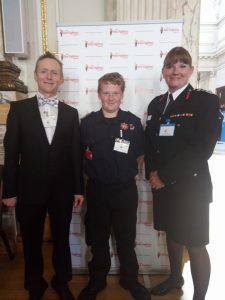 “I think that was the first time he realised he’d done something special,” says Kirstine. “He looked around the room and saw how many good people were there, and then he won an award among them, as a young supporter of the fire service.”
“I think that was the first time he realised he’d done something special,” says Kirstine. “He looked around the room and saw how many good people were there, and then he won an award among them, as a young supporter of the fire service.”
“It was amazing, being recognised for the fundraising I am doing by the charity I am doing it for,” says Andrew. “It was nice for people to see what I’d been working so hard to do.”
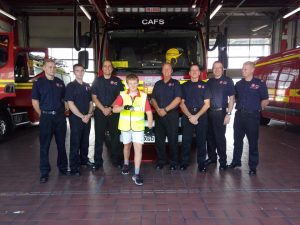 For Andrew, being autistic is no longer something that limits him. He has aspirations of joining some of the specialist detection teams among the fire service, and is keen to be part of the next generation coming up through the ranks, regardless of his disability.
For Andrew, being autistic is no longer something that limits him. He has aspirations of joining some of the specialist detection teams among the fire service, and is keen to be part of the next generation coming up through the ranks, regardless of his disability.
“I think it’s important we recognise our young people because they’re the next generation of people coming up through their communities,” he says. “We need to recognise them and give them more motivation so they just keep going, doing what they’re doing.”
